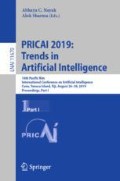Abstract
There are online forums such as changemyview where a user may submit his/her views on a subject matter, against which other users argue to try to change the opinions of his/hers. To measure the quality of such discussion, one useful criterion is how influential a given topic is to participating users’ opinion changes, as may be measured by the change (if any) in the proportion of supporting-objecting-mixed opinions by users. In this work, we incorporate the notion of agency into a previously proposed argumentation framework for issue-based information systems, QuAD, and formulate semantics of opinion transitions by newly considering agent-wise evaluation of QuAD initial scores.
Access this chapter
Tax calculation will be finalised at checkout
Purchases are for personal use only
Notes
- 1.
“CMV: There should exist a system to ensure politicians admit to their blatant lies” on reddit.com.
- 2.
“\(\textsf {and}\)” instead of “and” is used in this paper when the context in which it appears strongly indicates truth-value comparisons. It follows the semantics of classical logic conjunction.
References
Alchourrón, C.E., Gärdenfors, P., Makinson, D.: On the logic of theory change: partial meet contraction and revision functions. J. Symb. Logic 50, 510–530 (1985)
Amgoud, L., Ben-Naim, J.: Weighted bipolar argumentation graphs: axioms and semantics. In: IJCAI, pp. 5194–5198 (2018)
Amgoud, L., Besnard, P.: Bridging the gap between abstract argumentation systems and logic. In: Godo, L., Pugliese, A. (eds.) SUM 2009. LNCS (LNAI), vol. 5785, pp. 12–27. Springer, Heidelberg (2009). https://doi.org/10.1007/978-3-642-04388-8_3
Arisaka, R., Bistarelli, S.: Defence outsourcing in argumentation. In: COMMA, pp. 353–360 (2018)
Arisaka, R., Satoh, K.: Balancing rationality and utility in logic-based argumentation with classical logic sentences and belief contraction. In: Baldoni, M., Chopra, A.K., Son, T.C., Hirayama, K., Torroni, P. (eds.) PRIMA 2016. LNCS (LNAI), vol. 9862, pp. 168–180. Springer, Cham (2016). https://doi.org/10.1007/978-3-319-44832-9_10
Arisaka, R., Satoh, K.: Coalition formability semantics with conflict-eliminable sets of arguments. In: AAMAS, pp. 1469–1471 (2017)
Arisaka, R., Satoh, K., van der Torre, L.: Anything you say may be used against you in a court of law. In: Pagallo, U., Palmirani, M., Casanovas, P., Sartor, G., Villata, S. (eds.) AICOL 2015-2017. LNCS (LNAI), vol. 10791, pp. 427–442. Springer, Cham (2018). https://doi.org/10.1007/978-3-030-00178-0_29
Baroni, P., Rago, A., Toni, F.: From fine-grained properties to broad principles for gradual argumentation: a principled spectrum. Int. J. Approximate Reason. 105, 252–286 (2019)
Baroni, P., Romano, M., Toni, F., Aurisicchio, M., Bertanza, G.: Automatic evaluation of design alternatives with quantitative argumentation. Argument Comput. 6(1), 24–49 (2015)
Brewka, G., Eiter, T.: Argumentation context systems: a framework for abstract group argumentation. In: Erdem, E., Lin, F., Schaub, T. (eds.) LPNMR 2009. LNCS (LNAI), vol. 5753, pp. 44–57. Springer, Heidelberg (2009). https://doi.org/10.1007/978-3-642-04238-6_7
Cayrol, C., Lagasquie-Schiex, M.C.: On the acceptability of arguments in bipolar argumentation frameworks. In: Godo, L. (ed.) ECSQARU 2005. LNCS (LNAI), vol. 3571, pp. 378–389. Springer, Heidelberg (2005). https://doi.org/10.1007/11518655_33
Cayrol, C., Lagasquie-Schiex, M.-C.: Bipolarity in argumentation graphs: towards a better understanding. In: Benferhat, S., Grant, J. (eds.) SUM 2011. LNCS (LNAI), vol. 6929, pp. 137–148. Springer, Heidelberg (2011). https://doi.org/10.1007/978-3-642-23963-2_12
Dung, P.M.: On the acceptability of arguments and its fundamental role in nonmonotonic reasoning, logic programming, and n-person games. Artif. Intell. 77(2), 321–357 (1995)
Dunne, P.E., Hunter, A., McBurney, P., Parsons, S., Wooldridge, M.: Weighted argument systems: basic definitions, algorithms, and complexity results. Artif. Intell. 175(2), 457–486 (2011)
Gabbay, D.M., Garcez, A.S.D.: Logical modes of attack in argumentation networks. Stud. Logica. 93(2), 199–230 (2009)
Gabbay, D.M., Rodrigues, O.: An equational approach to the merging of argumentation networks. J. Logic Comput. 24(6), 1253–1277 (2014)
Introne, J., Laubacher, R., Olson, G., Malone, T.W.: The climate CoLab: large scale model-based collaborative planning. In: CTS, pp. 40–47 (2011)
Ito, T.: Towards agent-based large-scale decision support system: the effect of facilitator. In: HICSS (2018)
Katsuno, H., Mendelzon, A.O.: On the difference between updating a knowledge base and revising it. In: Belief Revision. Cambridge University Press (1992)
Kunz, W., Rittel, H.W.J., Messrs, W., Dehlinger, H., Mann, T., Protzen, J.J.: Issues as elements of information systems. Technical report, University of California (1970)
Leite, J., Martins, J.: Social abstract argumentation. In: IJCAI, pp. 2287–2292 (2011)
Malone, T.W., Klein, M.: Harnessing collective intelligence to address global climate change. Innov. Technol. Gov. Global. 2(3), 15–26 (2007)
Menini, S., Cabrio, E., Tonelli, S., Villata, S.: Never retreat, never retract: argumentation analysis for political speeches. In: AAAI, pp. 4889–4896 (2018)
Patkos, T., Bikakis, A., Flouris, G.: A multi-aspect evaluation framework for comments on the social web. In: KR, pp. 593–596 (2016)
Prakken, H., Sartor, G.: Argument-based extended logic programming with defeasible priorities. J. Appl. Non-class. Logics 7, 25–75 (1997)
Rago, A., Toni, F.: Quantitative argumentation debates with votes for opinion polling. In: An, B., Bazzan, A., Leite, J., Villata, S., van der Torre, L. (eds.) PRIMA 2017. LNCS (LNAI), vol. 10621, pp. 369–385. Springer, Cham (2017). https://doi.org/10.1007/978-3-319-69131-2_22
Rago, A., Toni, F., Aurisicchio, M., Baroni, P.: Discontinuity-free decision support with quantitative argumentation debates. In: KR, pp. 63–73 (2016)
Rienstra, T., Perotti, A., Villata, S., Gabbay, D.M., van der Torre, L.: Multi-sorted argumentation. In: Modgil, S., Oren, N., Toni, F. (eds.) TAFA 2011. LNCS (LNAI), vol. 7132, pp. 215–231. Springer, Heidelberg (2012). https://doi.org/10.1007/978-3-642-29184-5_14
Acknowledgement
We thank anonymous reviewers for suggestions on future work.
Author information
Authors and Affiliations
Corresponding author
Editor information
Editors and Affiliations
Rights and permissions
Copyright information
© 2019 Springer Nature Switzerland AG
About this paper
Cite this paper
Arisaka, R., Ito, T. (2019). Semantics of Opinion Transitions in Multi-Agent Forum Argumentation. In: Nayak, A., Sharma, A. (eds) PRICAI 2019: Trends in Artificial Intelligence. PRICAI 2019. Lecture Notes in Computer Science(), vol 11670. Springer, Cham. https://doi.org/10.1007/978-3-030-29908-8_54
Download citation
DOI: https://doi.org/10.1007/978-3-030-29908-8_54
Published:
Publisher Name: Springer, Cham
Print ISBN: 978-3-030-29907-1
Online ISBN: 978-3-030-29908-8
eBook Packages: Computer ScienceComputer Science (R0)

